Welcome to the first edition of the Cercle IA newsletter.
This first edition in brief:
- ChatGPT gets out of its window and into action: ChatGPT Agents can click, write, analyze… alone. OpenAI’s big announcement, but first mixed reviews in the press.
- +43% more results for some consultants with GPT-4. A landmark Harvard-BCG study measures the real impact of GPT-4 on the quality of work of 758 BCG consultants (and reveals a pitfall to be avoided);
- Our selection of AI books to read this summer to lay the right foundations in AI before the start of the new school year;
- The AI tool to test Leexi, theBelgian (and European)AI notetaker.
Last Wednesday (July 16, 2025), I gave a training session at Van Breda on the topic of “How to use AI as a personal assistant”. A structured format aligned with the tools of the moment.
The following day, OpenAI released theagent ChatGPT agent.
Literally overnight, my training was outdated.
Not obsolete, but already late.
So, I’ve got a busy AI schedule for the summer. This week, while everyone seems to be on vacation, I’m working on the Cercle IA summer schools that will be held just before the start of the new school year (one for consulting professions and another for lawyers).
I’m also preparing to give a seminar on professionalization in the age of artificial intelligence at the IHECS.
But it’s obvious: it’ s almost impossible to keep up to date with AI.
It’s very difficult to keep up with the daily flow of new products, to test them out and at the same time to have enough height to sort out what’s essential, what’s accessory and what’s frivolous when it comes to AI.
That’s why it’s crucial to know where you’re coming from in AI, and above all to think about where you’re going.
A single answer is not enough. We need to look at the personal, professional and societal levels.
To stand a chance in this exercise, you need to develop a general AI culture (or “AI literacy”). For this, books are your best allies.
To envision the future, you need courage, imagination (or realism, depending on your point of view) and to choose your path right now.
The days of “wait and see” are over.
After an initial analysis of the launch of the ChatGPT agent, I’m sharing with you a first selection of books on AI to get answers to essential questions about the use of AI at work, its issues in education and in our human relationships.
I’m currently collecting book suggestions from experts, entrepreneurs and political figures (to leave yours here). However, it’s better to start with “simple” reading than to aim for complexity.
Then, for those in the consulting profession, I share a benchmark study conducted by Harvard-Wharton.
Objective: to measure the real impact of GPT-4 on the productivity and quality of work of consulting professionals. To obtain answers, researchers conducted a full-scale experiment with 758 Boston Consulting Group consultants (i.e. 7% of the workforce).
The bottom line: consultants at all levels make progress with AI (except in one specific case, when they fall).
ChatGPT Agent: revolutionary productivity tool or web ghost?
On July 17, 2024, OpenAI announced the launch of theChatGPTagent with a powerful promise: ChatGPT doesn’t just think, it acts.
Equipped with its own virtual computer, ChatGPT could now manage complex tasks from start to finish, automatically selecting the right skills for each mission.
In concrete terms, according to OpenAI you can now ask ChatGPT:
- “Look at my calendar and give me an update on my next appointment customers according to current events” or
- “Analyze three competitors and create a presentation”.
ChatGPT browses the web, filters relevant information, guides you to secure connections if necessary, executes code, performs analysis and delivers finalized, ready-to-use documents.
Presented as a revolution, the ChatGPT agent is based on an agentic system that merges three OpenAI technologies:
(i) Operator, for interactions with websites, (ii) Deep Search, for information retrieval and synthesis, and (iii) ChatGPT’s conversational intelligence.
So this new version of ChatGPT won’t just answer your questions.
ChatGPT could now act on its own: browse sites, click, write, buy, analyze… all in a virtual browser integrated into your own.
The ChatGPT agent is initially available to paying users (Pro, Plus and Team plans). Access to this feature will be extended to Enterprise and Edu users in the coming weeks.
But the ChatGPT agent is not yet available in Europe (and Switzerland).
Europe’s access to the latest functionalities is lagging behind. So we need to look ahead and anticipate these changes, while our competitors and peers on other continents can get ahead of the game.
Please note: the tech press has strongly qualified the enthusiasm of this announcement:
“OpenAI’s ChatGPT Agent Is Haunting My Browser” – Wired
WIRED describes a strangely disconcerting experience with several ChatGPT agents acting simultaneously in the browser, clumsily reproducing human behaviors (phantom clicks, involuntary site visits) while raising questions about their reliability and advertising impact.
“My 8 ChatGPT Agent tests produced only 1 near-perfect result – and a lot of alternative facts” – The Verge
After testing ChatGPT Agent on 8 concrete projects, the author concludes that the tool fails to deliver reliable results in the majority of cases – hallucinations, slowness, erroneous links – with only one truly conclusive test out of eight, revealing that the promise of autonomy remains largely out of step with reality.
👉 Verdict: too unstable to justify the $200/month… unless you like to experiment.
Our selection of AI books to read in 2025
Co-intelligence: Living and working with AI - Ethan Mollick
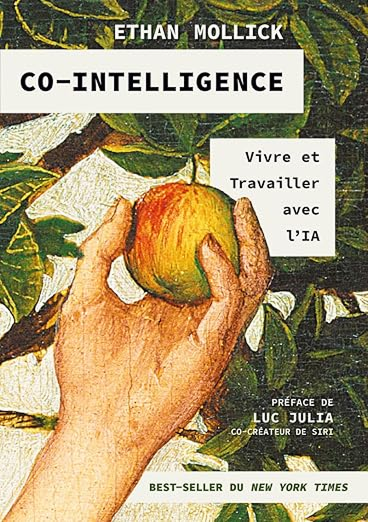
Published in April 2024, this book seems almost “old” but remains a classic whose lessons stand up to the rapid evolution of AI (and the author’s enthusiasm is contagious).
Ethan Mollick is a Wharton professor and author of the popular newsletter One Useful Thing.
In Co-intelligence, he proposes a lucid and pragmatic approach to collaboration between humans and artificial intelligence – a “co-intelligence” that combines the strengths of both worlds.
A new world: How AI is revolutionizing education - Salman Khan
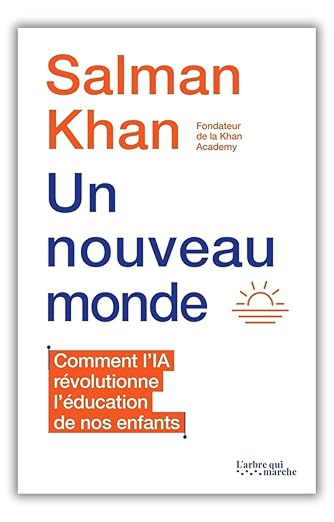
The future depends on the quality of education. As we approach the 3rd school year since the launch of ChatGPT, it’s high time to reflect and rethink the way we teach in the age of AI.
Here too, I was won over by the positive vision developed in this book by Salman Khan (founder of the Khan Academy).
A manifesto for the school of the future, where generative AI is a catalyst for transforming the education of children (and their parents).
HBR Guide to Generative AI for Managers - Elisa Farri & Gabriele Rosani
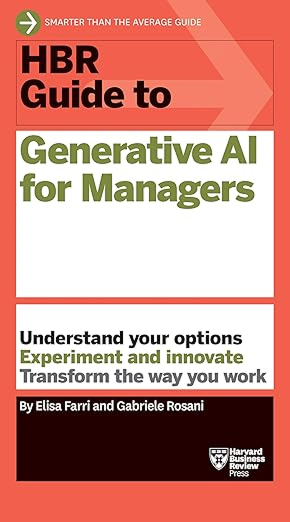
Bonjour ChatGPT : How AI is changing our relationships - Louis de Diesbach
AI can seem like a wilderness to be explored. It’s best to venture in with a plan, or even a survival guide.
With this ultra-actionable guide, you’ll never be alone on planet AI.
Case studies and concrete strategies for integrating generative AI into your management role.
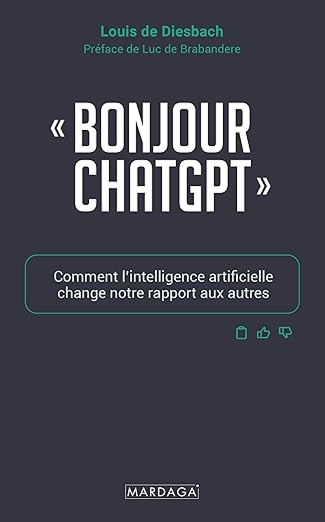
How to take advantage of the potential of AI, while keeping a critical eye and ensuring that authentically human values and interactions are preserved.
In Bonjour ChatGPT, Louis de Diesbach explores our potentially dangerous liaisons with conversational AIs on which it’s so easy to project human characteristics.
A multidisciplinary reflection on the impact of ChatGPT and emerging technologies on our interactions and behaviors.
Want to find out more? Read our full article with this selection of AI books.
Harvard-Wharton study: 758 BCG consultants to test the true performance of AI in consulting
Researchers conducted a full-scale experiment with 758 Boston Consulting Group consultants (7% of the workforce).
Objective: to measure the real impact of GPT-4 on the productivity and quality of work of consulting professionals.
Three groups were formed:
- consultants without AI,
- consultants with access to GPT-4, and
- consultants with GPT-4 + prompt engineering training.
Impressive results
Increased productivity :
- +12.2% jobs completed
- +25.1% speed of execution
Top quality :
- +40% quality judged by external experts
Level equalization :
- Weak” consultants increase by +43%.
- The “strongest” grow by +17%.
The fall beyond the “irregular” technological frontier
But beware: the study also reveals the limits. When the task falls outside the AI’s capabilities, performance drops drastically. Consultants with AI become 19 percentage points less likely to produce a correct solution.
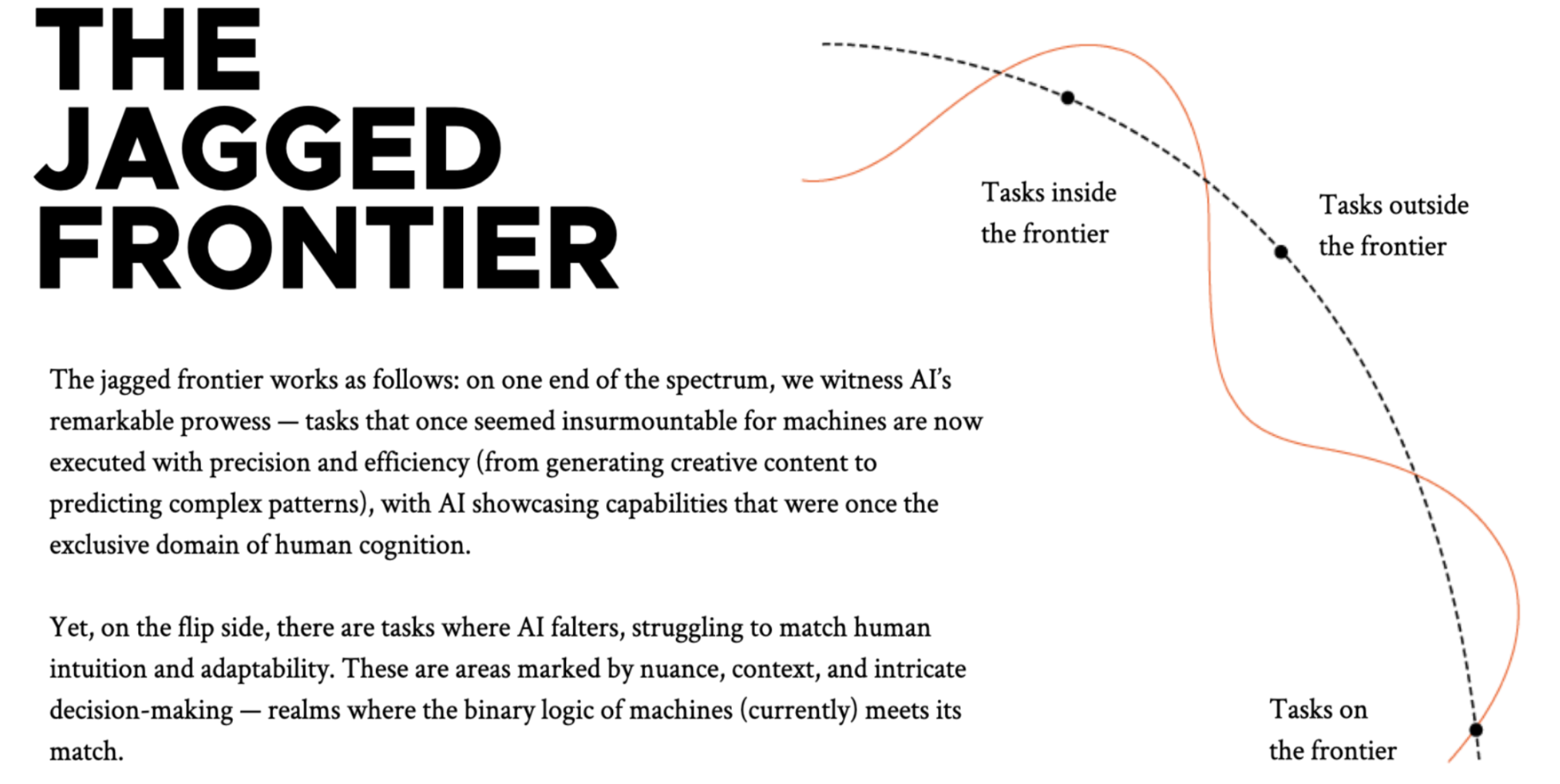
Contrasting performances
In the “peaks ” (basic to moderate writing, idea generation, structured analysis)
– + 12.2% tasks delivered
– + 25.1% time saved
– + 40% perceived quality
(prompt engineering group vs. control)
In the “hollows ” (strategic decisions, nuanced interpretation)
– – 19 pts reliability, exposing to hallucinations
Why this study is important
This study reveals several key points:
- AI is not optional: the gains in productivity and quality are too great to ignore.
- All levels of consultants benefit: AI “upgrades” the less experienced and enables the best to go even further.
- Training is essential: knowing how to use AI can’t be improvised, and having the right tools isn’t enough to get results.
- We need to understand the shifting boundaries of AI capabilities : knowing where AI excels and where it fails is an essential business skill to avoid costly mistakes and take advantage of major productivity gains.According to the joint Harvard Business School & BCG study (Dell’Acqua et al., 2023), generative AI does not progress uniformly: its successes and failures form a “jagged frontier”, where its strengths (repetitive tasks, formatting, data synthesis) rub shoulders with its weaknesses (complex reasoning, contextual judgment).
The tool to test : Leexi

Leexi is AI assistant software for business meetings, specializing in automated note-taking, transcription, synthesis and analysis of meetings and business calls.
Founded in 2022 in Brussels, Leexi is a 100% family-owned startup (founded by Carole and Xavier Lombard and two of their sons, Baptiste and Matthieu). Leexi targets sectors such as sales, customer service, consulting and recruitment. Its ISO 27001-certified, RGPD-compliant solution automates the capture and summarization of exchanges in over 120 languages, while guaranteeing total data security and sovereignty (hosted exclusively in Europe).
Leexi integrates directly with the main videoconferencing tools (Google Meet, Microsoft Teams, Zoom), as well as with CRM and telephony systems already used by companies, facilitating adoption without impacting existing processes.
Why you should test Leexi :
- Real-time contextual capture so you never miss an exchange.
- Automatic extraction of decisions, outstanding issues and tasks to be assigned.
- Instant distribution of summaries to your collaborative tools for smooth follow-up.
- Measurable impact on your teams’ productivity and responsiveness.
Before leaving us…
Three simple actions to make sure you don’t miss a thing:
✅ S ubscribe to receive future analyses
✅ S hare this newsletter with a contact interested in AI
✅ Let us know which topic interests you most or ask us a question.
Don’t forget to put your knowledge into practice.
Thank you for reading the Cercle IA newsletter to the end!
This newsletter may contain affiliate links to tools that I personally test and approve. Your purchases via these links support the editorial work (more than a day per newsletter) at no extra cost to you.

